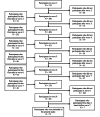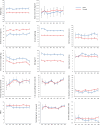An in-person survey of the influence of the COVID-19 pandemic on physical function, functional capacity, cognitive function, and mental health among community-dwelling older adults in Japan from 2016 to 2022
- PMID: 38789923
- PMCID: PMC11127291
- DOI: 10.1186/s12877-024-05055-5
An in-person survey of the influence of the COVID-19 pandemic on physical function, functional capacity, cognitive function, and mental health among community-dwelling older adults in Japan from 2016 to 2022
Abstract
Background: The COVID-19 outbreak might have had several effects on older adults; however, much of the previous research only included self-report, cross-sectional, and online-survey data in the early stage of the pandemic. We conducted a face-to-face survey before and after the COVID-19 pandemic and investigated the influence of the pandemic on several functions to distinguish between changes due to aging and changes due to the pandemic using a linear mixed model.
Methods: A total of 8 longitudinal surveys were conducted from 2016 to 2022. Physical function was assessed by weight, body mass index, body fat percentage, skeletal muscle mass index, calf circumference, grip strength, knee extension strength, the 5-times chair stand test, the timed up & go test and 5-m walking test. Functional capacity was measured using the Tokyo Metropolitan Institute of Gerontology index of competence, cognitive function was measured using the Trail Making Test - A, and mental health was measured using the Geriatric Depression Scale.
Results: Of a total of 73 participants, 51 (69.9%) were female. The mean age at first participation was 71.82 years (SD = 4.64). The results of the linear mixed model showed that lower-limb muscle strength and body fat percentage and cognitive function changed significantly before and after the pandemic, while grip strength, functional capacity, and mental health did not.
Conclusions: The changes in these functions between before and after the pandemic might be attributed to the diminished opportunities for the independent older individuals to go out and engage in activities. Although functional capacity did not change, lower-limb muscle strength is important for functional independence. This decline might influence the functional capacity of these individuals in the future.
Keywords: COVID-19 pandemic; Community-dwelling older adults; Depressive symptoms; Longitudinal survey; Lower-limb muscle strength.
© 2024. The Author(s).
Conflict of interest statement
YF received research grants from the Murata Science Foundation. KI was an advisor for private health care services under Clinical Study Support, Inc. HT served as a scientific advisor for Taisho Pharmaceutical Co., Ltd., and received personal fees from Eisai Co. Ltd., Daiichi Sankyo Co. Ltd. and MSD Co. Ltd., outside the submitted work. The other authors have no conflicts of interest to declare.
Figures
Similar articles
-
The physical capabilities underlying timed "Up and Go" test are time-dependent in community-dwelling older women.Exp Gerontol. 2018 Apr;104:138-146. doi: 10.1016/j.exger.2018.01.025. Epub 2018 Feb 2. Exp Gerontol. 2018. PMID: 29410234
-
Characteristics of Japanese Older Adults Whose Trunk Muscle Mass Decreased during the COVID-19 Pandemic.Int J Environ Res Public Health. 2022 Sep 11;19(18):11438. doi: 10.3390/ijerph191811438. Int J Environ Res Public Health. 2022. PMID: 36141711 Free PMC article.
-
A cross-sectional study of the association between dynapenia and higher-level functional capacity in daily living in community-dwelling older adults in Japan.BMC Geriatr. 2017 Jan 3;17(1):1. doi: 10.1186/s12877-016-0400-5. BMC Geriatr. 2017. PMID: 28049446 Free PMC article.
-
Evolution of physical function, cognition, depressive mood, and quality of life during the Covid-19 pandemic in prefrail elderly people: A longitudinal cohort study (Covid-Mefap).Exp Gerontol. 2022 Oct 15;168:111946. doi: 10.1016/j.exger.2022.111946. Epub 2022 Sep 5. Exp Gerontol. 2022. PMID: 36064159 Free PMC article. Review.
-
Effects of protein supplementation on lean body mass, muscle strength, and physical performance in nonfrail community-dwelling older adults: a systematic review and meta-analysis.Am J Clin Nutr. 2018 Nov 1;108(5):1043-1059. doi: 10.1093/ajcn/nqy192. Am J Clin Nutr. 2018. PMID: 30475963
Cited by
-
Dual group-based trajectories of physical activity and cognitive function in aged over 55: a nationally representative cohort study.Front Public Health. 2024 Oct 29;12:1450167. doi: 10.3389/fpubh.2024.1450167. eCollection 2024. Front Public Health. 2024. PMID: 39534743 Free PMC article.
References
-
- Castaldelli-Maia JM, Marziali ME, Lu Z, Martins SS. Investigating the effect of national government physical distancing measures on depression and anxiety during the COVID-19 pandemic through meta-analysis and meta-regression. Psychol Med. 2021;51(6):881–93. doi: 10.1017/S0033291721000933. - DOI - PMC - PubMed
-
- Cenat JM, Blais-Rochette C, Kokou-Kpolou CK, Noorishad PG, Mukunzi JN, McIntee SE, Dalexis RD, Goulet MA, Labelle PR. Prevalence of symptoms of depression, anxiety, insomnia, posttraumatic stress disorder, and psychological distress among populations affected by the COVID-19 pandemic: a systematic review and meta-analysis. Psychiatry Res. 2021;295:113599. doi: 10.1016/j.psychres.2020.113599. - DOI - PMC - PubMed
-
- Zipprich HM, Schonenberg A, Teschner U, Prell T. Changes of perceptions and behaviours during the phases of COVID-19 pandemic in German elderly people with neurological disorders: an observational study using telephone interviews. BMJ Open. 2021;11(1):e045780. doi: 10.1136/bmjopen-2020-045780. - DOI - PMC - PubMed
MeSH terms
Grants and funding
LinkOut - more resources
Full Text Sources
Medical



